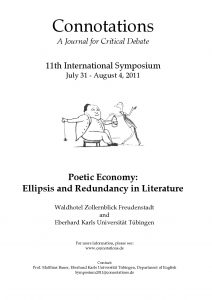Poetic Economy

Writers and critics reflecting on poetic production have frequently answered that question by focussing on the necessity of avoiding superfluity; every single element of a work is to fulfil its function in the best possible way. […] The concept of functionality (each part is required and what is not functional is not required) combines organic as well as economic principles, as it is based on the assumption that there is no waste in nature. “Economy” becomes no less relevant when we take a step from considering inherent structure (elements in relation to the organon as a whole) to considering the function of a work as a realization of its author’s ideas, as an image of life, or as having a particular effect on its audience. […] What exactly is the relationship, for example, between the idea that there should be no word that can be left out without risking the collapse of the whole work and the idea that much (a complex idea or subject matter) should be expressed by sparing means?
From: Matthias Bauer, “Poetic Economy: Ellipsis and Redundancy in Literature”
Articles in this special issue
- Poetic Economy: Ellipsis and Redundancy in Literature
Matthias Bauer
Connotations Vol. 21: 159-64 - In Their Own Words: On Writing in Second Person
Joshua Parker
Connotations Vol. 21: 165-76 - Leaps and Bounds: Hawthorne’s Strategies of Poetic Economy
Elena Anastasaki
Connotations Vol. 21: 177-197 - "Mistah Kurtz—he dead" in Company: Redundancy and Ellipsis
William Harmon
Connotations Vol. 21: 198-217 - Elegance and Poetic Economy in John Crowe Ransom and F. T. Prince
Rajeev S. Patke
Connotations Vol. 21: 218-40 - Pinter’s Fractured Discourse in The Homecoming
Maurice Charney
Connotations Vol. 21: 241-55 - Literary Allusions and Poetic Economy: Billy Collins’s "Albany" and William Wordsworth’s "I wandered lonely as a cloud
Judith Saunders
Connotations Vol. 21: 256-71 - John Lyly's Poetic Economy
Arthur F. Kinney
Connotations Vol. 22: 1-12 - Poe’s Economies and “The Fall of the House of Usher”
Hannes Bergthaller
Connotations Vol. 22: 13-31 - The Economy of Literary Interpretation
David Fishelov
Connotations Vol. 22: 32-56 - Ellipsis and Aposiopesis in “The Love Song of J. Alfred Prufrock”
Edward Lobb
Connotations Vol. 22: 167-86 - A Collection of Selves: Louis MacNeice’s Autumn Journal
Teresa Bruś
Connotations Vol. 22: 187-213 - Language Matters: An Investigation into Cliché in The Light of Day
Andrew James
Connotations Vol. 22: 214-34 - "Undressed—— / today's role dangles / from a metal hanger": Figurativity and the Economy of Means in Contemporary English Haiku
Sven Wagner
Connotations Vol. 23: 1-15 - "Thy words do finde me out": Reading the Last Line of "Affliction (I)"
Inge Leimberg
Connotations Vol. 24: 1-16